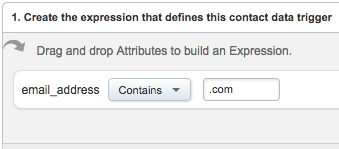we are building a Custom Activity within Journey Builder. We've followed the provided documentation but are struggling to complete this.
My understanding is that a Custom Activity is triggered from a Trigger within Journey Builder, that is, either a default Trigger (from within Journey Builder) or a Custom Trigger.
The workflow for a Custom Activity as I understand it is:
- User selects Custom Activity in Journey Builder
- User configures the Custom Activity through iframe and clicks Save
- Custom Activity fires a
requestPayloadevent - Custom Activity listens for a
getPayloadevent from Jouney Builder
Assuming this is correct, I am trying to understand how the getPayload event works.
Remember that the Custom Activity is triggered from a Trigger or Custom Trigger — I would have assumed that the getPayload event would be able to pass the value of the Trigger.
For example, when creating a Trigger, you select a Data Extension then assign a filter, like the example below.

I would have assumed that it's possible to get the filter result passed to the getPayload event, that is the Data Extension and Subscriber Keys that meet the filter criteria defined in the Trigger, however I can't figure out how to do this.
The Custom Activity is obviously going to be dependent on the result of the Trigger, (for example, do something for recipients that meet the Trigger criteria), so I would have thought I can retrieve this data from the Trigger.
Can someone shed some light on this?
